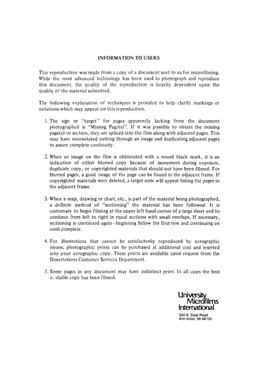| dc.contributor.author | Lawson, Michael Shannon, | en_US |
| dc.date.accessioned | 2013-08-16T12:28:56Z | |
| dc.date.available | 2013-08-16T12:28:56Z | |
| dc.date.issued | 1983 | en_US |
| dc.identifier.uri | https://hdl.handle.net/11244/5150 | |
| dc.description.abstract | Since Kohlberg's concept of moral development differs significantly from Dewey's, this paper recommends that Kohlberg's educational programs be withheld from classrooms or clearly explained to parents who may not adhere to Kohlberg's unique philosophy. | en_US |
| dc.description.abstract | In Chapter II, John Dewey rejects any transcendent principles for morality and defines morals as culturally relative customs. Lawrence Kohlberg proposes justice as the transcendent principle for morality and rejects cultural relativism in his definition of morality. In Chapter III, John Dewey describes how morals emerge almost exclusively from social encounters with minimal innate instincts and impulses. Lawrence Kohlberg asserts that morals are fundamentally innate with social context necessary only as a catalyst to cause these values to emerge. In Chapter IV, John Dewey suggests that moral behavior is produced by dynamic self-projection and not adherence to transcendent principles. Lawrence Kohlberg argues that no behavior can be labled truly moral unless the transcendent principle of justice motivates it and rejects egocentrism as a legitimate moral motive. In Chapter V, John Dewey emphasizes a strong social context for the development of morality while Lawrence Kohlberg emphasizes a strong cognitive context for the development of morality. | en_US |
| dc.description.abstract | Lawrence Kohlberg has provided the education community with a theory of moral development which he claims is an extension of John Dewey's philosophy. Four specific ideas within both Lawrence Kohlberg's and John Dewey's concepts of moral development were analyzed. Their definitions of morality, explanation of moral origins, descriptions of motives for moral behavior and proposals for moral education show clear contrasts. This paper concludes that Kohlberg's theory is not an extension of Dewey's philosophy. | en_US |
| dc.format.extent | vii, 116 leaves ; | en_US |
| dc.subject | Education, Philosophy of. | en_US |
| dc.title | John Dewey and Lawrence Kohlberg : contrasting concepts of moral development. | en_US |
| dc.type | Thesis | en_US |
| dc.thesis.degree | Ph.D. | en_US |
| dc.thesis.degreeDiscipline | Jeannine Rainbolt College of Education | en_US |
| dc.note | Source: Dissertation Abstracts International, Volume: 44-06, Section: A, page: 1722. | en_US |
| ou.identifier | (UMI)AAI8324878 | en_US |
| ou.group | Jeannine Rainbolt College of Education | |
